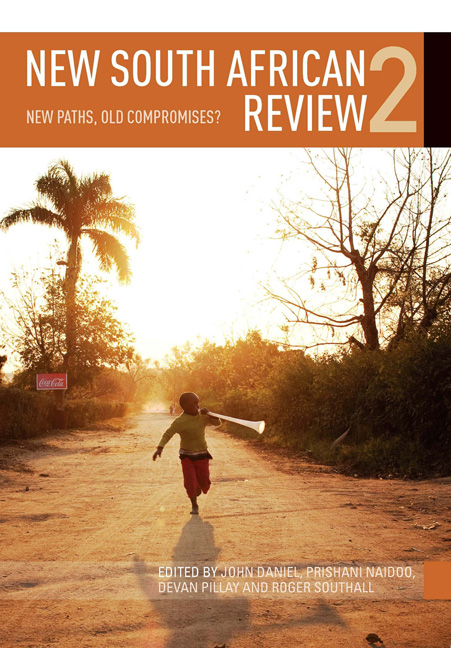Book contents
- Frontmatter
- Contents
- Preface
- Introduction: New paths, old (com)promises?
- PART 1 POLITICS AND INTERNATIONAL
- PART 2 ECONOMY AND SOCIETY
- Introduction: Continuing crises, contradictions and contestation
- Chapter 8 ‘The wages are low but they are better than nothing’: The dilemma of decent work and job creation in South Africa
- Chapter 9 The crisis of childcare in South African public hospitals
- Chapter 10 The worker cooperative alternative in South Africa
- Chapter 11 Policing in the streets of South African townships
- Chapter 12 BEE Reform: The case for an institutional perspective
- Chapter 13 Bokfontein amazes the nations: Community Work Programme (CWP) heals a traumatised community
- PART 3 ENVIRONMENT
- PART 4 MEDIA
- Contributors
- Index
Introduction: Continuing crises, contradictions and contestation
from PART 2 - ECONOMY AND SOCIETY
Published online by Cambridge University Press: 23 March 2018
- Frontmatter
- Contents
- Preface
- Introduction: New paths, old (com)promises?
- PART 1 POLITICS AND INTERNATIONAL
- PART 2 ECONOMY AND SOCIETY
- Introduction: Continuing crises, contradictions and contestation
- Chapter 8 ‘The wages are low but they are better than nothing’: The dilemma of decent work and job creation in South Africa
- Chapter 9 The crisis of childcare in South African public hospitals
- Chapter 10 The worker cooperative alternative in South Africa
- Chapter 11 Policing in the streets of South African townships
- Chapter 12 BEE Reform: The case for an institutional perspective
- Chapter 13 Bokfontein amazes the nations: Community Work Programme (CWP) heals a traumatised community
- PART 3 ENVIRONMENT
- PART 4 MEDIA
- Contributors
- Index
Summary
The chapters in this section provide a glimpse into the complicated, difficult and contested worlds of policy making and the implementation of policy (and laws) in an economy and society that continue to be characterised by high levels of racialised inequality, unemployment and poverty. Through analyses of the ongoing crisis in childcare in South African public hospitals and an experience of street-level policing in a South African township, some insight is gained into the relationship between economic choices and social outcomes; into the difficulties of government; and into the very real ways in which existing social relations and meanings, and/or problems and tensions at the level of communities and groups can contribute to how laws and policies are able to be enforced and implemented. The remaining chapters hone in on different economic models and choices that have been adopted and made post-1994, looking at their successes and failures or potentials for success, from different forms of cooperatives, to black economic empowerment, to strategies for decent work currently being experimented with by national government in the form of community work programmes, and proposed in the New Growth Path (NGP). Individually and together, the chapters in this section confirm that problems such as the crisis in healthcare and conflicts between communities and police are both ‘social’ and ‘economic’, requiring approaches that bring together ‘social’ and ‘economic’ solutions. Recent debates about economic policy and its social effects are also shaping the political realm, with Cosatu and the ANC Youth League differing with the ANC on the New Growth Path and prospects for nationalisation respectively.
Haroon Saloojee's chapter on the crisis of childcare in South African public hospitals opens a window onto a catastrophe facing the entire health system, a crisis explained to be the result of ‘a national healthcare system designed to prioritise treatment over prevention’. This crisis is one characterised by ‘rampant diseases such as HIV/AIDS and tuberculosis; excessively high maternal and child mortality; poorly motivated health professionals; shut-down of critical units in hospitals; and perennial shortages of vitally needed supplies and equipment’.
Information
- Type
- Chapter
- Information
- New South African Review 2New paths, old compromises?, pp. 156 - 159Publisher: Wits University PressPrint publication year: 2012
